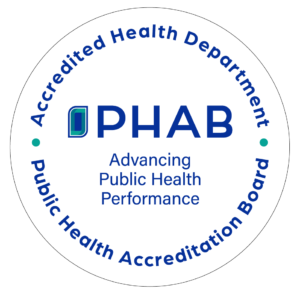Location and Phone
120 S. Hays Street, Suite 200
Bel Air, MD 21014
410-877-2300
Rabies FAQs
Rabies is a viral disease of mammals that is most often transmitted through the bite of a rabid animal. The virus attacks the nervous system and affects the brain and spinal cord of humans and animals. In Maryland, rabies is most frequently found in raccoons, cats, foxes, skunks, bats, and groundhogs.
Rabies is found in the saliva of infected animals.
If not treated, Rabies almost always results in fatal encephalitis, an inflammation of the brain and its membranes.
- Do not feed wild animals or approach any wild animal or stray pet.
- Be a responsible pet owner. Keep all rabies vaccinations current for all dogs, cats, and ferrets.
- Keep your pets under direct supervision so they do not come into contact with wild animals.
- Do not leave food outside that may attract wild animals.
- Call Harford County Animal Control to remove any stray pets from your neighborhood.
- Care for the wound. Thoroughly wash with soap and water then apply an antiseptic.
- If possible to do so without further endangering yourself, confine the animal and call the Harford County Health Department, Community Hygiene Division at 410-877-2300
- See your private provider or nearest ER for further wound care, tetanus immunization as necessary, and/or recommendations concerning post-exposure rabies treatment.
- If treatment is recommended, the Health Department will consult with you and your provider to determine the best course of action.
Rabies pre-exposure vaccinations are offered to those who have frequent animal exposure through work or
volunteering. Pre-exposure vaccination can decrease the need for extensive post-exposure treatment in the
event of a rabies contact. Please contact the Harford County Health Department, Infectious Disease Program
at 410-612-1779 if you have questions regarding this service.
Post-exposure vaccinations are recommended to those who have been in contact with a known positive
animal or an animal that cannot be found for testing. Pease contact the Harford County Health Department,
Infectious Disease Program at 410-612-1779 if you have questions regarding post-exposure rabies vaccination.
Each year the HCHD receives phone calls from concerned citizens who have found a bat in their residence.
Although most bats are not infected with the rabies virus, finding a bat inside a living area is cause for concern.
If a bat is found inside your residence, and there is a possibility that residents or pets may have had an
exposure, the bat must be safely captured and submitted for rabies analysis. Harford County Animal Control
or a licensed wildlife cooperator can assist you in safely capturing the bat. Once the bat has been captured,
please contact the Harford County Health Department, Community Hygiene Division at 410-877-2300. A
thorough risk assessment of all residents and pets will be completed. If available, the bat will be sent to the
state laboratory for testing. If the bat can not be captured, or is unavailable for testing, please contact the
Harford County Health Department, Infectious Disease Division at 410-612-1779 for a risk assessment. If you
would like to learn more about bats and rabies, please visit the Centers for Disease Control and Prevention’s
website.
There is no doubt raccoons can be pests and can spread germs to humans, including rabies. However most people don’t know that it is important to keep raccoons out of your pool and watch for raccoon feces (poop) in and around your pool. Raccoon feces can sometimes contain the eggs of a worm called Baylisascaris procyonis, which can infect humans, particularly children, and cause severe neurological illness.
For more information regarding Baylisascaris procyonis please visit the Centers for Disease Control website. http://www.cdc.gov/healthywater/swimming/pools/animals/raccoons-and-pools.html . Or if you have any questions please contact the Harford County Health Department’s Bureau of Environmental Health for further assistance.
As a general rule, the public should leave wildlife alone where found, particularly Rabies Vector Species like
raccoons, foxes, skunks, bats, and groundhogs. Licensed wildlife rehabilitators take care of orphaned, sick or
injured wildlife. A list of licensed wildlife rehabilitators can be found at the Department of Natural Resources
website.
If your pet has been bitten or scratched by a domestic animal, obtain the name, address and phone number of
the animal’s owner. Follow-up with the animal’s owner 10 days after the bite occurred to confirm that the
biting/scratching animal is still healthy.
If your pet has been bitten or scratched by a wild or stray animal, do not touch your pet or the wild animal
with your bare hands. Only if it is safe to do so, capture or confine the animal and call Harford County Animal
Control at 410-638-3505 for it to be tested for rabies. If your pet has killed the wild or stray animal, contact
the Harford County Health Department, Community Hygiene Division at 410-877-2300 to collect the specimen
to send for testing. If the animal has run away or is otherwise not available for testing, contact the Harford
County Health Department, Community Hygiene Division at 410-877-2300 to discuss the potential quarantine
procedure for your pet.
Consult your veterinarian immediately after your pet is bitten or scratched by another animal, or is found to
have a wound of unknown origin. Your vet will likely recommend a rabies vaccination booster.
More information can be found via the Center for Disease Control (CDC) website: http://www.cdc.gov/rabies
Pets are quarantined after biting/scratching a person or after contact with a wild or stray animal. The quarantines are only to ensure that there was no rabies transmission and are not to punish the animal or the animal owner.
- 10 Day Quarantines: Dogs or cats that have bitten or scratched a person are placed on a 10 day quarantine, starting from the date of the bite or scratch. Representatives from the Harford County Health Department will verify the health of the animal, in-person, after the end of the 10 day quarantine. After the health of the animal is confirmed, there is no risk that the animal could have transmitted rabies at the time of the bite or scratch. Medical professionals who provide care to a person with an animal bite or scratch are required to complete an Animal Bite/Scratch Report and send it to the Harford County Health Department. This does not mean that the biting/scratching animal is in trouble or that they will be designated as a dangerous animal. This report will be completed even if it is the person’s own animal that bit/scratched them or for an accidental bite/scratch. During the 10 day quarantine, the animal must be kept on a leash or tether when outside. If the animal becomes sick, exhibits strange behavior, or dies, you must contact the Harford County Health Department, Community Hygiene Division at 410-877-2300. The animal must not be given away, surrendered, or euthanized without first contacting the Harford County Health Department.
- 45 Day Quarantines: A pet that has been exposed to a rabid animal*, and has been previously vaccinated for rabies, will be quarantined for 45 days. Immediately booster your pet for rabies after exposure to a rabid animal. During the 45 day quarantine, limit animal and human contact to those within your household. Do not allow your pet to run free, including in a fenced yard. Contact the Harford County Health Department, Community Hygiene Division prior to relocating your pet to another address, surrendering ownership, or euthanizing your animal. Immediately contact Harford County Health Department, Community Hygiene Division at 410-877-2300 if your pet demonstrates any significant changes in behavior, escapes, becomes ill, or dies. *Rabid animals are animals that have been tested positive for rabies. Animals that have tested unsatisfactory for rabies or wild animals that are unavailable for testing are also treated as positive for rabies.
- Four Month Quarantines: A pet that has been exposed to a rabid animal*, and has NOT had a previous rabies vaccine, will be strictly quarantined for four months. If your pet has not ever received a rabies vaccine, immediately vaccinate your pet after exposure to wildlife. During the four month quarantine, your pet must be secured within a double-caged, escape-proof enclosure, such as a dog crate within a closed room. Provide all items your pet may need within the double enclosure, such as a bed, litter box, food, water, toys, etc. The health department must verify the enclosure arrangements. Dogs must be secured on a leash at all times when taken outside, and may not have contact with other animals or people. Limit exposure to the animal by having only one primary caregiver. Contact the Harford County Health Department, Community Hygiene Division prior to relocating your pet to another address, surrendering ownership, or euthanizing your animal. Immediately contact the Harford County Health Department, Community Hygiene Division 410-877-2300 if your pet demonstrates any significant changes in behavior, escapes, becomes ill, or dies. *Rabid animals are animals that have been tested positive for rabies. Animals that have tested unsatisfactory for rabiesor wild animals that are unavailable for testing are also treated as positive for rabies.


